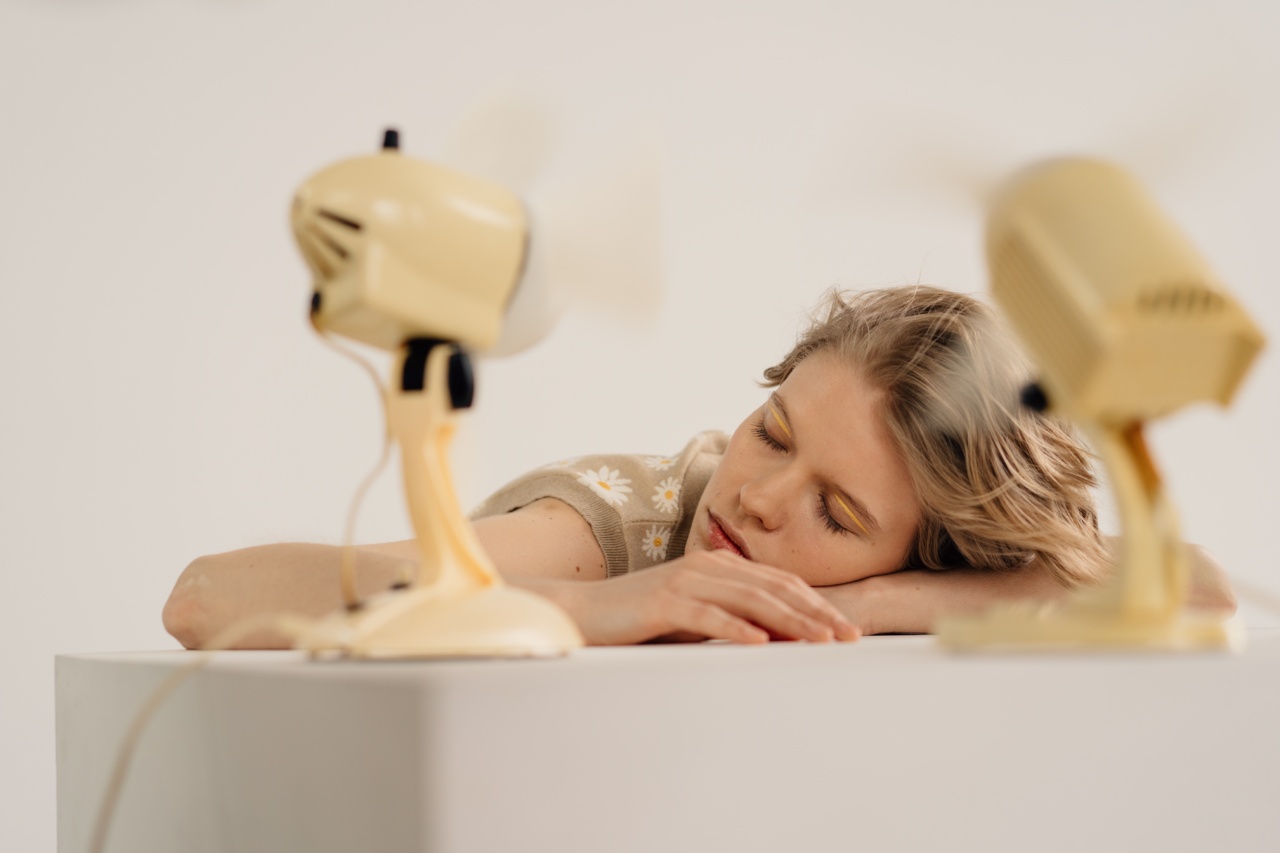During the scorching summer months, sleeping with a fan on seems like the most efficient way to beat the heat. The cool breeze generated by the fan provides a comforting environment and helps regulate room temperature.
However, concerns about the health implications of sleeping with a fan have been circulating for quite some time. In this article, we will delve into the potential risks and benefits associated with this common practice.
The Drying Effect of Fans
One of the main concerns raised about sleeping with a fan on is its drying effect on the body. Fans create air currents that can cause moisture on our skin to evaporate, leaving it feeling dry and potentially leading to dry or itchy skin.
This can be particularly problematic for individuals with pre-existing skin conditions like eczema or psoriasis.
Air Circulation and Allergies
Fans excel at circulating air within a room, which can be beneficial in terms of overall ventilation. However, this constant airflow can also stir up dust, pollen, and other allergens that may have settled on furniture or other surfaces.
For individuals with respiratory allergies or asthma, this can trigger symptoms and exacerbate their condition, making it more challenging to breathe comfortably during sleep.
Sinus Congestion and Fan Usage
Many people rely on fans to alleviate sinus congestion and promote clear breathing. While fans may provide temporary relief, they can also have a negative impact on sinus conditions.
The constant stream of air can dry out nasal passages, causing discomfort and potentially worsening congestion in the long run. People prone to sinus infections or who have already irritated sinuses should be cautious about excessive fan usage.
Noise and Sleep Disruption
Although the white noise produced by fans can be soothing for some individuals, it can also disrupt sleep patterns for others.
The constant humming or whirring sound may lead to disturbed sleep, especially for light sleepers or those who are sensitive to noise. Additionally, if the fan rattles or makes other unusual noises, it can be a further source of annoyance and hinder a good night’s rest.
Dehydration and Electrolyte Imbalance
Another concern often associated with sleeping with a fan on is the potential for dehydration and electrolyte imbalance. As fans increase air circulation, they can cause increased sweating and fluid loss during sleep.
If one fails to replenish the lost fluids adequately, it can lead to dehydration and potentially affect the balance of electrolytes in the body. Staying hydrated is crucial, especially in warmer climates or for individuals who tend to sweat excessively.
Potential Benefits of Sleeping with a Fan On
While there are potential drawbacks to sleeping with a fan on, it is essential to acknowledge the potential benefits as well. Let’s explore a few of these:.
1. Temperature Regulation
One of the primary advantages of sleeping with a fan on is temperature regulation. Fans can create a cooling effect, helping to lower the overall temperature in the room.
This can be particularly beneficial for individuals who struggle with restless sleep due to hot and stuffy environments. A comfortable room temperature can improve the quality of sleep and make falling asleep easier.
2. White Noise and Sleep Enhancement
For some individuals, the ambient noise created by fans can have a calming effect, promoting relaxation and better sleep.
White noise, like that produced by a fan, can mask background noises and provide a consistent and soothing sound environment for sleep. This can be particularly valuable in noisy urban areas or for those who live in apartments with thin walls.
3. Air Circulation and Ventilation
As mentioned earlier, fans are excellent at circulating air within a room. This airflow can improve overall ventilation, preventing stagnant air from accumulating and reducing the risk of allergens or odors lingering in the bedroom.
Adequate ventilation can create a more refreshing and breathable sleep environment.
4. Psychological Comfort
Sleeping with a fan on can provide psychological comfort, especially for individuals accustomed to the sensation of moving air while they sleep. It can be a familiar and reassuring presence, creating a sense of security and promoting sleep onset.
The psychological benefits of feeling cool and comfortable during sleep should not be disregarded.
Optimizing Fan Usage for Health and Comfort
Considering the potential risks and benefits, it’s crucial to strike a balance when using a fan for sleep. Here are some tips to optimize fan usage:.
1. Position the Fan Carefully
Position the fan in a way that it does not directly blow air onto your face or body. This can help minimize the drying effect on the skin and reduce the risk of discomfort or sinus issues.
Indirect airflow or placing the fan further away from the bed can create a more comfortable sleep environment.
2. Clean the Fan Regularly
Dust and allergens can accumulate on fan blades and grills, reducing air quality and potentially exacerbating allergies. Regularly clean your fan to prevent the accumulation of dust and maintain optimal ventilation.
This will help minimize potential irritants and promote a healthier sleep environment.
3. Use a Timer or Adjustable Settings
Consider utilizing a timer or adjustable settings on the fan to regulate airflow duration and intensity. This can help prevent prolonged exposure to the drying effect and minimize potential sleep disturbances caused by excessive noise or cold air.
4. Hydrate Before Bed
To counter the potential dehydration caused by increased sweating during sleep with a fan on, make sure to hydrate adequately before bed. Drink a glass of water or have a hydrating beverage to maintain fluid balance and promote overall well-being.
Conclusion
Sleeping with a fan on can have both positive and negative effects on your health, depending on individual circumstances and preferences.
While the drying effect, potential allergies, and sleep disruptions are concerns that should not be ignored, fans can also provide temperature regulation, ventilation, white noise benefits, and psychological comfort. By being mindful of fan usage, positioning, cleanliness, hydration, and personal needs, individuals can optimize the benefits while minimizing any potential negative impact.































